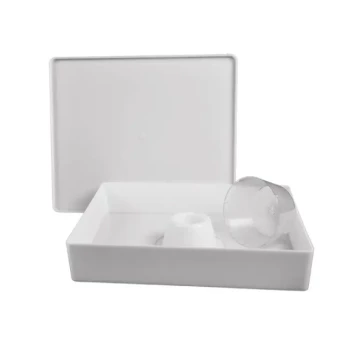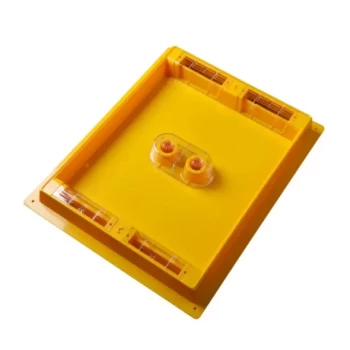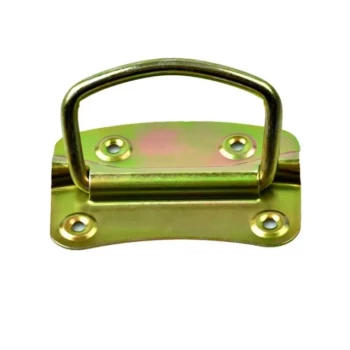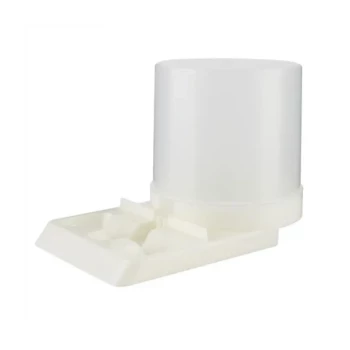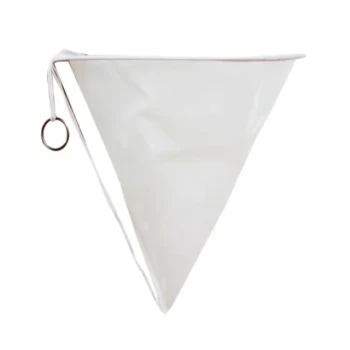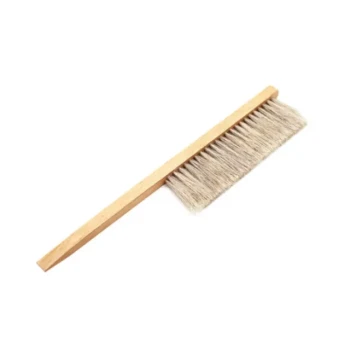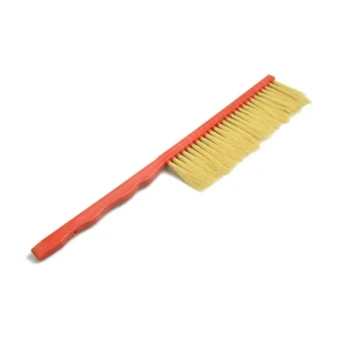The primary benefit of an insulated beehive is its ability to create a more stable and energy-efficient home for the honeybee colony. By buffering the hive from external temperature swings and helping to manage internal moisture, insulation reduces the stress and workload on the bees. This allows them to dedicate more energy to crucial tasks like raising brood and producing honey.
An insulated hive acts like a well-insulated home, demanding less energy from its inhabitants to maintain a comfortable temperature. This conserved energy directly translates into a healthier, more productive, and resilient bee colony.
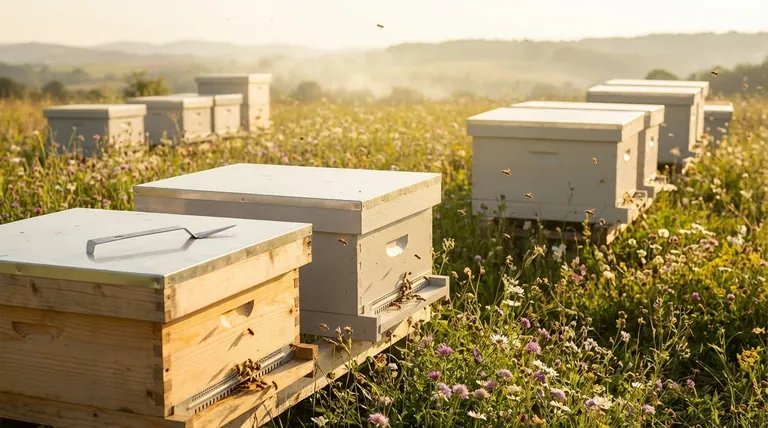
The Core Principle: Reducing Colony Stress
A bee colony's primary, non-stop job is maintaining the internal hive environment, especially the brood nest, at a consistent temperature (around 95°F or 35°C). Insulation makes this critical task significantly easier.
Stabilizing Internal Temperature
Insulation slows the transfer of heat between the inside of the hive and the outside world. This keeps the hive cooler during intense summer heat and, more importantly, warmer during the winter cold.
The result is a much more stable internal climate, free from the drastic temperature fluctuations that can stress a colony.
Conserving Critical Energy
Bees regulate temperature through physical effort. In the cold, they form a tight cluster and vibrate their wing muscles to generate heat. In the heat, they fan their wings and perform "evaporative cooling" with water.
All of this activity consumes significant energy in the form of honey. An insulated hive reduces the need for this work, allowing bees to conserve their precious food stores.
Boosting Colony Productivity
Energy saved on thermoregulation is energy that can be reallocated to other vital activities.
A colony in an insulated hive can dedicate more resources to raising young bees, foraging for nectar and pollen, and producing a larger honey surplus.
A Critical Advantage: Moisture Management
While temperature is important, managing moisture—especially in winter—is a primary factor in colony survival. This is where insulation provides one of its greatest benefits.
The Problem with Condensation
As the bee cluster generates heat and respiration, it releases warm, moist air. When this air hits a cold surface, like an uninsulated inner cover, it condenses into water droplets.
This condensation can drip down onto the bees, chilling or even killing the cluster. A wet hive is a cold hive and a breeding ground for disease.
How Insulation Prevents Condensation
Insulated hive walls and lids stay warmer, keeping their interior surface temperature above the dew point.
This prevents condensation from forming in the first place. Instead of condensing and dripping, the moist air can be properly managed and removed through the hive's ventilation channels.
Understanding the Trade-offs
While highly beneficial, adopting insulated hives requires a clear understanding of what they do and do not accomplish.
Higher Initial Cost
Insulated hives, whether made of high-density polystyrene or modified wood, typically have a higher upfront cost than standard wooden Langstroth equipment. This investment should be weighed against the long-term benefits of improved colony health and survival.
Ventilation Is Still Essential
Insulation is not a replacement for proper ventilation. An insulated hive that is sealed too tightly can trap excessive moisture and carbon dioxide.
The goal is a warm, dry hive, not a sealed container. Insulation and ventilation must work together as a system to create an ideal environment.
Is an Insulated Hive Right for You?
Choosing your equipment depends entirely on your climate and beekeeping goals.
- If your primary focus is winter survival in a cold climate: An insulated hive is a powerful tool, helping the cluster conserve vital energy and, most importantly, preventing deadly internal condensation.
- If your primary focus is maximizing honey production: By reducing the energy bees spend on thermoregulation in both hot and cold weather, insulation can directly contribute to higher honey yields.
- If you are beekeeping in an extremely hot climate: Insulation provides critical shade and relief, reducing the colony's need to fan and fetch water, which allows for more efficient work inside the hive.
By managing the hive's environment, you empower your bees to do what they do best: thrive.
Summary Table:
| Benefit | Key Impact on Colony |
|---|---|
| Temperature Stability | Reduces energy spent on heating/cooling, leading to healthier brood. |
| Moisture Management | Prevents deadly condensation, a major cause of winter colony loss. |
| Energy Conservation | Bees use less honey for thermoregulation, increasing honey yields. |
| Colony Productivity | More energy is available for foraging and raising young bees. |
Ready to build stronger, more productive apiaries? At HONESTBEE, we supply commercial apiaries and beekeeping equipment distributors with high-quality, durable insulated beehives and equipment designed to maximize colony health and operational efficiency. Let our wholesale-focused solutions help you achieve higher survival rates and better honey yields. Contact our team today to discuss your needs and request a quote!
Visual Guide
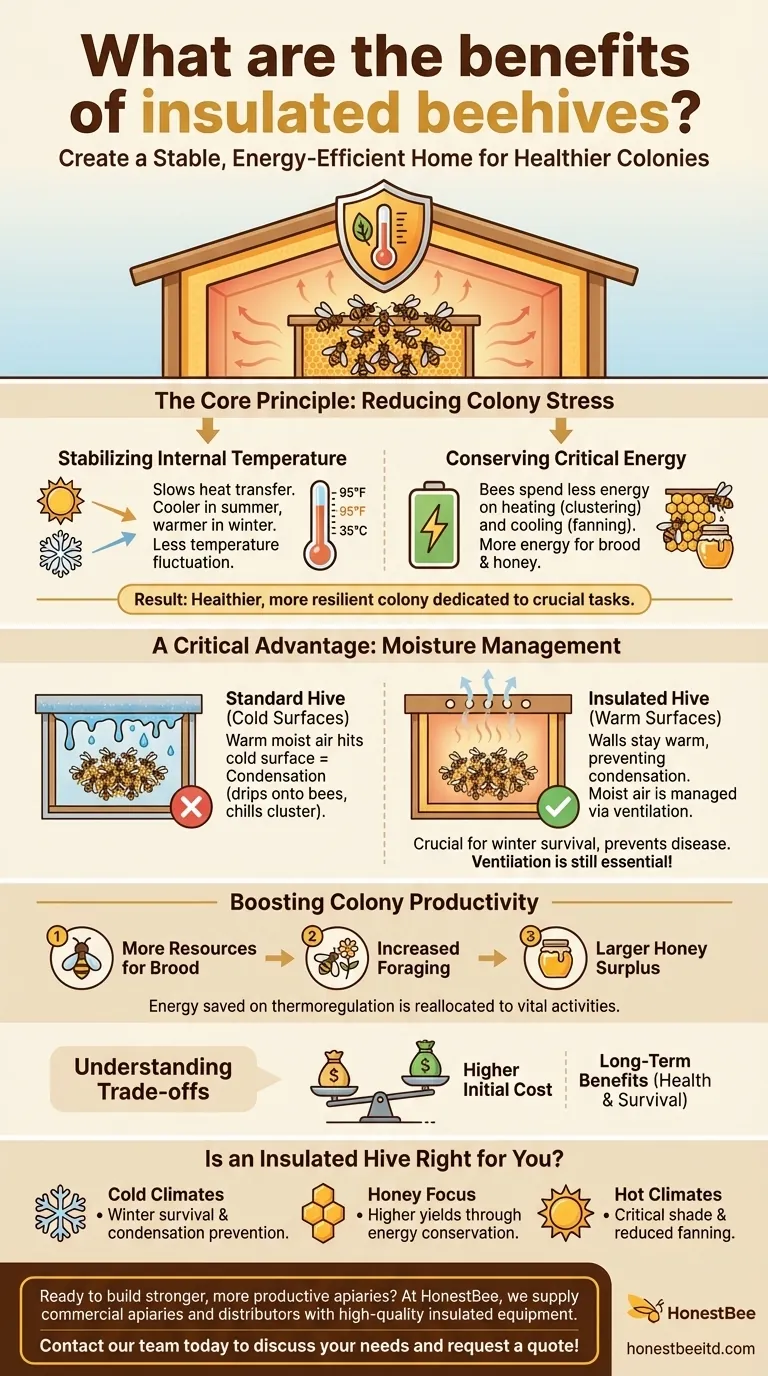
Related Products
- HONESTBEE Professional Long Handled Hive Tool with Precision Cutting Blade
- Telescopic Beehive Outer Cover Lid Roof with Galvanised Sheeting for Langstroth Hive and Beehive Outer Cover
- Black Plastic Beetle Barn Hive Beetle Trap for Beehives
- Professional Galvanized Hive Strap with Secure Locking Buckle for Beekeeping
- HONESTBEE Professional Hive Top Bee Feeder Feeding Solution
People Also Ask
- What is the hive tool used for? The Essential Multi-Tool for Every Beekeeper
- What are the basic tools for beekeeping? Essential Starter Kit for Safe & Successful Hive Management
- What is the operational mechanism of a beehive smoker? Master Bee Calm and Safety During Harvesting
- How does standardized beehive manufacturing equipment improve the productivity of commercial apiaries?
- What are the difficulties of conducting a beehive inspection without a hive tool? Avoid Propolis and Colony Stress




